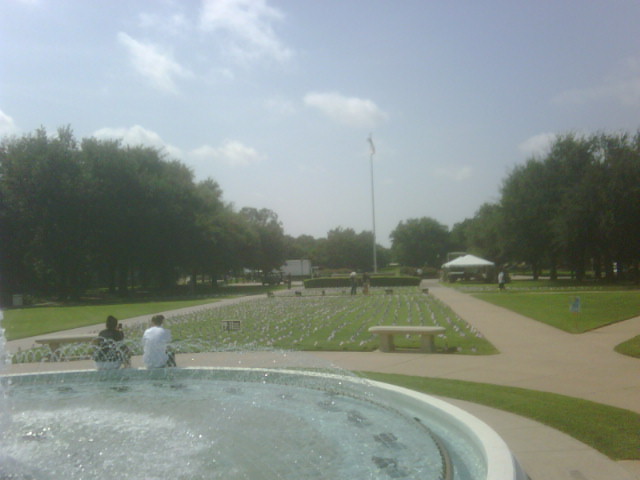 On the main quad of SMU appears about 3000 tiny American flags, and a sign asking us to never forget. We won’t. But rather that just worrying about not forgetting, I find it a more valuable personal exercise to ask also what we value, and how those values are influenced by the shadow of the attacks on September 11, 2001.
On the main quad of SMU appears about 3000 tiny American flags, and a sign asking us to never forget. We won’t. But rather that just worrying about not forgetting, I find it a more valuable personal exercise to ask also what we value, and how those values are influenced by the shadow of the attacks on September 11, 2001.
I value the freedom of personal inquiry, the freedom to doubt those who would bring a belief system into direct conflict with the natural world, and freedom from the violence that is often brought to bear against those who would challenge authority with truth. These values are enshrined in various parts of the Constitution as freedom of speech; freedom of religion, but also freedom from religious persecution; freedom of the press; and freedom from unwarranted search and seizure.
As a scientist, all of these are deep values to me and in the United States I find my scientific freedom maximized and fulfilled by these basic rights. I am free to inquire, to challenge statements of unanchored belief with the reality of nature, to print my findings without fear of unwarranted censorship, to have rights to my work without fear of theft by an authority, and freedom from the tyranny of suppression of natural laws by overly literal interpretation of sacred text.
But just as I value these rights in my own life, I value the right of others to enjoy the same. I respect that those with whom I disagree have platforms for their views, and I would fight for the same protections of property and inquiry for those very same people. I may not tolerate those who lie and cheat the public with false claims about the natural world, but I respect that they have the right to say it. I respect that eventually the law may be brought to bear against them.
And in the end, it’s the law derived from our Constitutional principles that is the arbiter of right and wrong. Whether it’s Kitzmiller v. Dover or some other nexus of law and values, I have respect for a system that long-term regresses toward the path of preserving Constitutional rights. I am proud to live in a country that makes such things possible.
I have the most deep respect for Nature, who abides by no mortal Constitution except that writ deep into the structure of the universe. Nature knows its principles and, in the end, defines the most fundamental judgment and tolerance. When beliefs clash with Nature, Nature has always won. I want to be on the side of Nature, and in this country I have the freedom to choose that allegiance. For if the rights of man truly proceed from the creation, then it a great good to seek to understand the laws of that creation so that we might have respect for the origins of our own moral law.


